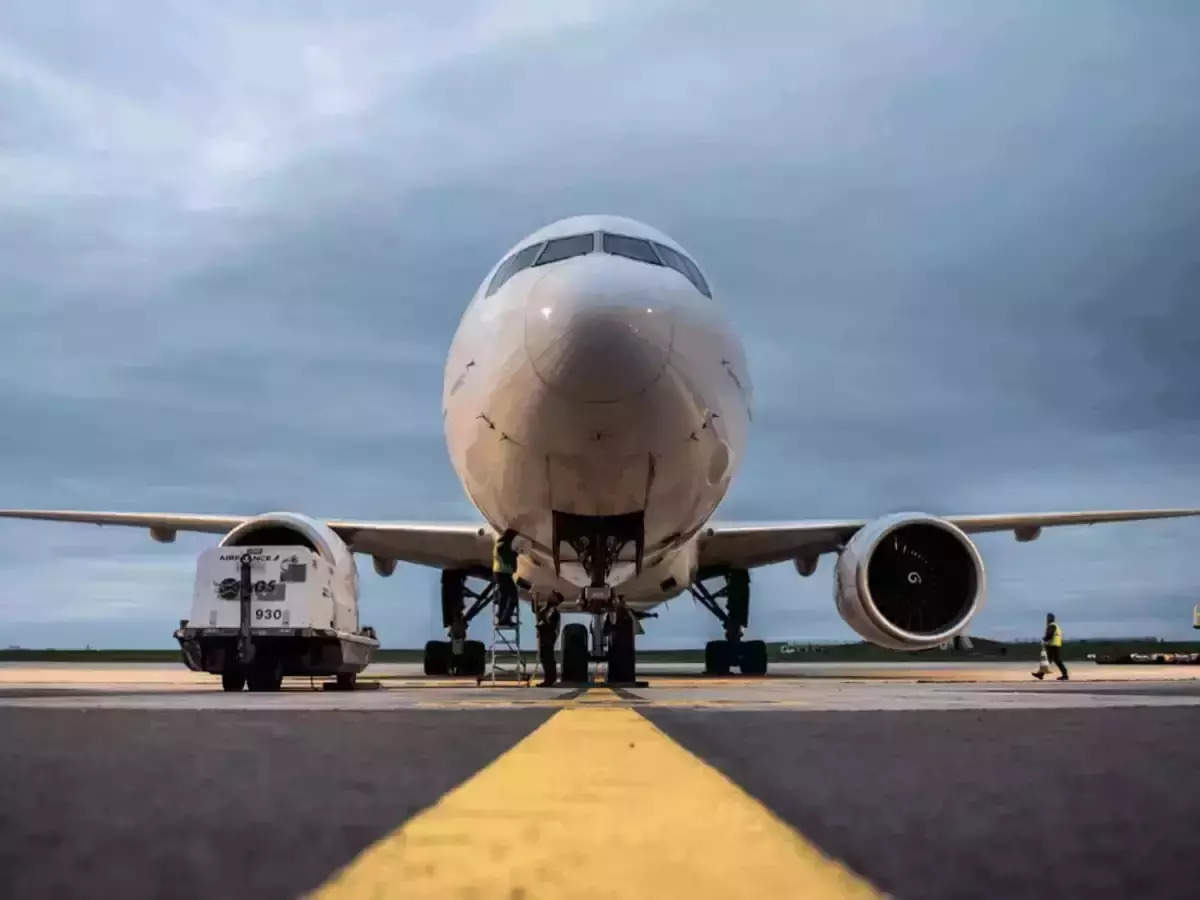The COVID-19 pandemic has been a global crisis, affecting millions of people around the world. Despite efforts to contain the virus, it continues to spread rapidly, with new cases being reported every day. Recently, a flight from Italy to India became the center of attention as several passengers were found to be infected with the virus.
RajkotUpdates.News brings you the latest update on this incident that shook many countries around the globe. The article dives into how this incident occurred and what measures were taken by authorities to contain its spread. This unfortunate event serves as a reminder that even with strict protocols in place, one small mistake can have serious consequences in today’s world where no country is safe from this deadly virus.
Introduction to the COVID Explosion Incident on the Flight from Italy
On March 6th, 2020, a flight from Italy to Mauritius experienced what has been referred to as a “COVID Explosion” incident. The flight was carrying 227 passengers and nine crew members. Upon arrival in Mauritius, it was discovered that over two dozen passengers had tested positive for COVID-19.
The incident sparked outrage and concern as it highlighted the potential dangers of international travel during the pandemic. The Italian government faced criticism for not taking stronger measures to control the spread of the virus within its borders before allowing citizens to travel abroad.
In response to the COVID Explosion incident, many countries implemented stricter measures for international travelers, including mandatory testing and quarantine protocols upon arrival. The incident also emphasized the importance of transparency and communication between airlines, governments, and health officials in managing outbreaks on flights and preventing their spread around the world.
Details of the Flight and Origin of the Outbreak
According to recent reports, a flight from Italy is being investigated as the potential source of a COVID-19 outbreak in India. The flight in question arrived at the Ahmedabad airport on March 6th, and it’s believed that several passengers onboard were infected with the virus. From there, many of these individuals traveled to different parts of India, including Rajkot.
The exact details of how the virus spread are still being investigated, but it’s clear that the outbreak was severe. In Rajkot alone, more than 200 cases were reported within just a few days following the arrival of these infected travelers. This prompted local officials to take urgent action to contain the spread and prevent further transmission.
It’s worth noting that this is not an isolated incident – similar outbreaks have been reported around the world over the past year. However, this serves as a stark reminder of just how easily COVID-19 can spread through air travel and highlights the importance of strict screening measures for all incoming passengers.
Understanding the Severity and Scale of the COVID Infections
The COVID-19 pandemic has been a global health crisis for over a year now. The severity and scale of the infections have varied from region to region, with some countries being hit harder than others. In India, it was reported that a flight from Italy brought in an explosion of COVID cases to Rajkot city.
The severity of the COVID infection can be understood by looking at the impact it has had on individuals and communities. The virus is highly contagious and can cause severe respiratory illness, leading to hospitalization and even death in some cases. Additionally, the scale of the pandemic can be seen through its widespread transmission across continents, affecting millions of people globally.
It is important to understand the severity and scale of COVID infections as it helps in taking appropriate measures to control its spread. Governments around the world have implemented lockdowns, social distancing protocols, mask mandates, and vaccination drives to mitigate the impact of this pandemic. It is crucial for everyone to follow these guidelines to ensure that we overcome this crisis together as one global community.
Also Read: Tata Group Secures Rights for 2022 and 2023 IPL Seasons: RajkotUpdates.news Coverage
Immediate Response and Containment Measures on the Flight
The COVID-19 pandemic has created an urgent need for immediate response and containment measures on flights. The recent COVID explosion on a flight from Italy to India highlights the importance of such measures. As soon as it was discovered that several passengers had tested positive for the virus, authorities took swift action to contain its spread.
Firstly, all passengers were immediately isolated, and their contacts traced for testing and quarantine. Secondly, the plane was disinfected thoroughly before any other passengers were allowed to board. Thirdly, strict screening protocols were put in place at airports to ensure that only healthy people would be allowed to travel.
These measures demonstrate how seriously authorities are taking the threat of COVID-19 on flights. It is vital that everyone follows these guidelines carefully in order to prevent further outbreaks and protect public health.
Pros And Cons
Pros:
One potential benefit of this alarming news is that it serves as a wake-up call to the public about the seriousness of COVID-19. The virus is not just a problem in certain regions or countries; it can spread rapidly and impact people from all walks of life, including those who may have thought they were safe while traveling. This incident underscores the importance of taking precautions such as wearing masks, practicing social distancing, and avoiding unnecessary travel when possible.
Another potential positive outcome is that this situation highlights the need for increased collaboration and communication between nations to combat COVID-19. While it’s unclear at this point exactly how the infected passengers were able to board the flight from Italy, it’s likely that there were gaps in communication or coordination somewhere along the way. By identifying these gaps and working together more closely, we may be able to prevent future outbreaks from occurring.
Cons:
The most obvious downside of this news is that it represents a significant health risk to those who were on board the affected flight, as well as anyone they may have come into contact with since then. Depending on how many people were exposed and how quickly they are identified and isolated, there could be a surge in new cases in Rajkot or other areas impacted by this event.
In addition to the immediate health concerns, there may also be economic ramifications as a result of this outbreak.
Contact Tracing Efforts and Identification of Potential Spread
Contact tracing has been a crucial aspect of controlling the spread of COVID-19, especially in situations where there is a potential for mass exposure. In the case of the recent COVID explosion on a flight from Italy reported by RajkotUpdates.News, identifying and tracing all individuals who were on board and potentially exposed to the virus is essential. This includes passengers as well as crew members who may have had close contact with infected individuals.
Efforts to identify potential spread must also extend beyond those who were on board the flight. Contact tracing must be thorough and include individuals who may have come into contact with these passengers after they disembarked from the plane. This could include hotel staff, transportation operators, or anyone else who may have interacted with the group during their travels.
Ultimately, effective contact tracing efforts can help to contain outbreaks and prevent further transmission of COVID-19. By quickly identifying potentially infected individuals and taking necessary precautions such as quarantine measures or testing, public health officials can work towards mitigating the impact of this pandemic.
Quarantine Protocols and Health Assessments for Passengers
The COVID-19 pandemic has forced governments around the world to implement strict quarantine protocols and health assessments for passengers traveling by air. These measures are aimed at preventing the spread of the virus from one country to another. In India, for example, all international travelers arriving in the country are required to undergo a mandatory quarantine period of 14 days.
Apart from quarantine protocols, health assessments for passengers have also become an important aspect of air travel during the pandemic. Passengers are screened for symptoms such as coughing, fever, and difficulty breathing before boarding their flights. They may also be required to provide proof of a negative COVID-19 test result before being allowed to travel.
Despite these measures, there have been cases where infected individuals have managed to board flights and spread the virus among other passengers. The recent COVID explosion on a flight from Italy highlights the need for stricter enforcement of quarantine protocols and health assessments for passengers. Governments must work together with airlines and airports to ensure that these measures are implemented effectively and consistently across all regions.
Collaboration with International Health Authorities and Government Agencies
In the wake of the COVID explosion on a flight from Italy, collaboration with international health authorities and government agencies becomes more crucial than ever. The spread of infectious diseases knows no borders and requires a coordinated response from all involved parties.
Effective collaboration allows for the sharing of information, resources, and expertise to better identify and respond to potential outbreaks. This includes early detection and surveillance systems that can quickly identify cases and trace contacts, as well as robust communication channels to ensure timely dissemination of important information.
Furthermore, collaboration also extends to vaccine distribution efforts. With limited supplies initially available, it is critical for countries to work together in ensuring equitable access for all populations. Collaboration with international partners can help streamline supply chains and facilitate the sharing of best practices in vaccine distribution. Ultimately, only through strong partnerships can we effectively combat infectious diseases like COVID-19 on a global scale.
Also Read: RajkotUpdates.news: The Ministry of Transport Will Launch a Road Safety Navigation App
Impact on Travel Restrictions and Aviation Industry
The travel restrictions imposed by various countries across the world in response to the COVID-19 pandemic have had a profound impact on the aviation industry. As countries shut down their borders and airlines suspended their services, thousands of flights were cancelled, resulting in billions of dollars in losses for airlines. The aviation industry has also been hit hard by the decrease in demand for air travel as people are hesitant to fly due to health concerns.
The recent outbreak of COVID-19 on a flight from Italy only underscores these challenges faced by the aviation industry. The incident highlights how difficult it is to keep passengers safe during air travel when there is no way to guarantee that everyone onboard is free from infection. While airlines have implemented various measures such as mandatory masking, social distancing, and enhanced cleaning protocols, these efforts cannot completely eliminate the risk of transmission.
As governments continue to grapple with containing the spread of COVID-19 and implementing stricter travel restrictions, it remains unclear when or if air travel will return to pre-pandemic levels. Airlines will need to adapt and innovate if they hope to recover from this crisis and regain public trust in air travel safety.
Lessons Learned: Strengthening Precautionary Measures for Air Travel
The COVID-19 pandemic has highlighted the need for strengthening precautionary measures for air travel. The recent incident of an explosion of cases on a flight from Italy to India is a stark reminder of the importance of safety protocols in aviation. As countries begin to ease restrictions and resume air travel, it is vital to ensure that all necessary measures are in place to prevent the spread of infection.
Lesson 1: Stringent screening processes must be put in place at airports. This includes temperature checks, health declarations, and mandatory testing for passengers arriving from high-risk areas. Airlines should also have clear guidelines on how they will handle suspected cases onboard their flights.
Lesson 2: Adequate personal protective equipment (PPE) must be provided to all airport personnel, including airline staff and security personnel. This includes face masks, gloves, and eye protection gear. Airlines should also provide PPE kits to passengers before boarding the flight.
Lesson 3: Social distancing measures must be implemented throughout the journey, starting from check-in counters to boarding gates and inside aircraft cabins. Passengers should be seated apart as much as possible and airlines can consider blocking some seats or using alternate rows for social distancing purposes.
By implementing these lessons learned from the current situation and taking necessary precautions, we can ensure safe air travel during these challenging times while also preventing the spread of infections across borders through air routes.
Updates on the Investigation and Further Developments
The investigation into the COVID explosion on a flight from Italy has been ongoing since the incident occurred. Authorities have been working tirelessly to identify all passengers who were on board and have traced their movements since arriving in India. The passengers who tested positive for COVID-19 have been isolated and are receiving medical treatment.
Further developments include increased surveillance at airports, as well as health screenings for all international arrivals. The Indian government has also suspended all flights between India and Italy until further notice. Additionally, passengers arriving from countries with high cases of COVID-19 are required to undergo mandatory quarantine upon arrival.
It is important to note that while these measures may seem strict, they are necessary to prevent the spread of COVID-19 within India’s borders. As the situation continues to evolve, updates will be provided so that individuals can stay informed and take appropriate precautions to protect themselves and their loved ones from this virus.
Conclusion
In conclusion, the COVID explosion on the flight from Italy is a stark reminder of the continued threat posed by the pandemic. Despite widespread vaccination efforts, it is crucial that we remain vigilant and take necessary precautions to prevent further spread of the virus. This incident highlights the importance of international travel regulations and screenings to prevent infected individuals from entering other countries.
It is also important for individuals to continue following guidelines such as wearing masks, practicing social distancing, and getting vaccinated when possible. The pandemic has affected people worldwide, and it will take collective effort to overcome it. We must continue to work together as a global community in order to mitigate its impact and eventually bring an end to this crisis.
FAQ’s
Q: What is the current situation of the COVID explosion on the flight from Italy to Rajkot?
A: As of now, there have been 21 positive cases reported from the flight. All passengers have been quarantined and contact tracing efforts are underway.
Q: Is it safe to travel during the pandemic?
A: The decision to travel during the pandemic should be made carefully. It is important to consider factors such as destination restrictions, potential exposure risks, and personal health conditions before making any travel plans.
Q: What precautions should I take while traveling?
A: It is recommended to wear a mask at all times while in public areas and practice social distancing whenever possible. Additionally, frequent hand washing or use of hand sanitizer can also help prevent transmission of COVID-19. It may also be helpful to research quarantine guidelines for your destination before departing.




